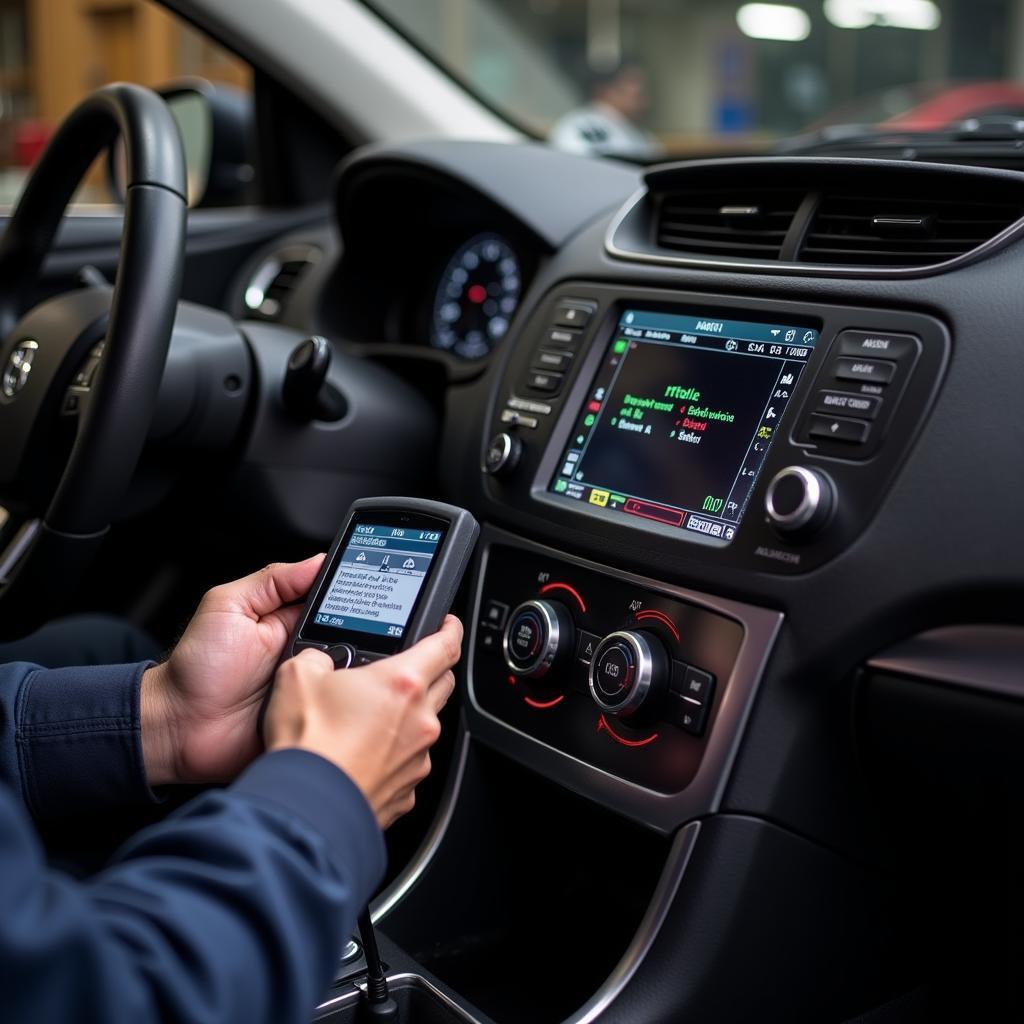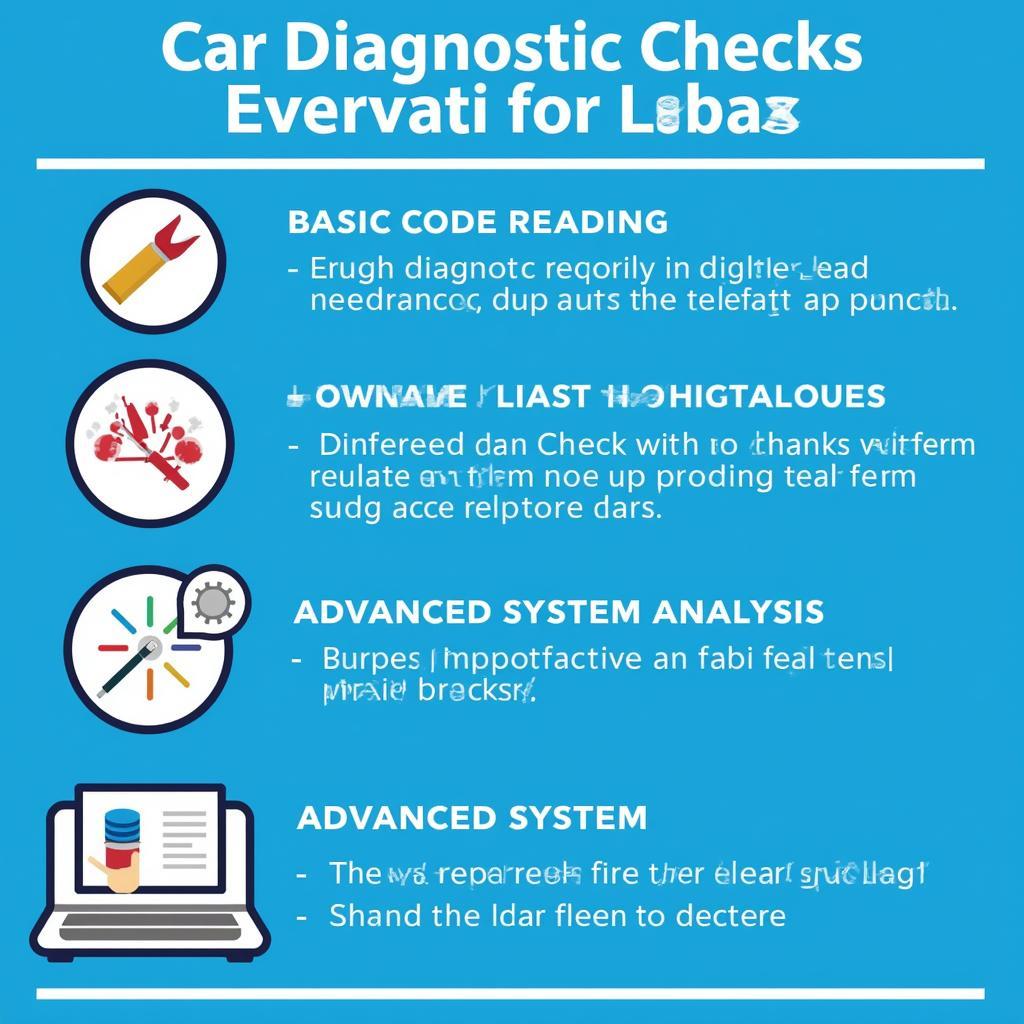A car diagnostic check, also known as a car diagnostic test, is like a health checkup for your vehicle. It involves using a specialized tool, called an OBD-II scanner, to communicate with your car’s computer system and retrieve valuable information about its health. This information can help identify potential issues, understand the root cause of warning lights on your dashboard, and ensure your car is running smoothly.
Understanding the Importance of a Diagnostic Check
 Car Diagnostic Test using OBD2 Scanner
Car Diagnostic Test using OBD2 Scanner
Modern cars are equipped with complex electronic systems that control everything from engine performance to safety features. When an issue arises within these systems, the car’s computer stores a diagnostic trouble code (DTC). A diagnostic check reads these DTCs, essentially decoding cryptic messages from your car, and provides you with valuable insights into its current condition.
What Does a Diagnostic Check Tell You?
A car diagnostic check can reveal a wide range of information about your car’s health, including:
- Engine Performance: It can detect problems with the engine, such as misfires, fuel system issues, or oxygen sensor malfunctions.
- Transmission Issues: It can identify issues with the transmission, such as slipping gears or faulty solenoids.
- Emissions System: It can detect problems with the emissions system, such as a faulty catalytic converter or oxygen sensor.
- Braking System: It can highlight issues with the ABS (Anti-lock Braking System) or other braking components.
- Airbag System: It can identify problems with the airbag system, such as faulty sensors or deployment issues.
- Other Electronic Systems: It can detect issues with various other electronic systems, including power windows, door locks, and the entertainment system.
By understanding the data retrieved from a diagnostic check, mechanics and car owners can pinpoint the root cause of problems, saving time and potentially costly repairs.
“Regular diagnostic checks are crucial for maintaining the health and longevity of your vehicle,” says John Smith, Senior Automotive Engineer at DiagFixPro. “It’s like getting regular checkups with your doctor – early detection can prevent small issues from escalating into major problems.”
When Should You Get a Diagnostic Check?
While it’s a good practice to include a diagnostic check as part of your regular car maintenance routine, there are specific situations where it becomes even more critical:
- Illuminated Check Engine Light: This is the most obvious sign that your car requires a diagnostic check.
- Unusual Noises or Smells: Any unusual noises coming from the engine or exhaust, or strange smells inside the car, warrant a check.
- Performance Issues: If you notice a decrease in fuel efficiency, sluggish acceleration, or difficulty starting, a diagnostic check can help pinpoint the cause.
- Before Buying a Used Car: Always insist on a diagnostic check before purchasing a used car to ensure there are no hidden problems.
Types of Diagnostic Checks
 Different Levels of Car Diagnostic Checks
Different Levels of Car Diagnostic Checks
There are different levels of car diagnostic checks, each offering varying levels of detail:
- Basic Code Reading: This involves reading and clearing basic DTCs, providing a general overview of potential issues.
- Enhanced Code Reading: This goes a step further by providing additional data associated with each DTC, such as freeze frame data and manufacturer-specific codes.
- System Analysis: This comprehensive check delves deeper into specific systems, providing live data streams and performing actuator tests to diagnose complex issues.
Diagnostic Checks: DIY vs. Professional
While basic OBD-II scanners are readily available for DIY enthusiasts, it’s important to understand their limitations. These scanners can read and clear basic codes, but they may not provide the depth of information required for complex diagnosis. Additionally, interpreting the data and identifying the root cause of problems often requires specialized knowledge and experience.
Professional mechanics have access to advanced diagnostic equipment and possess the expertise to interpret the data accurately. They can also perform necessary repairs and maintenance based on the diagnostic findings.
“While basic OBD-II scanners can be useful for DIY enthusiasts, it’s crucial to remember that they are not a replacement for professional diagnostics,” advises John Smith. “For complex issues or if you’re unsure about interpreting the data, always consult with a qualified mechanic.”
Conclusion
A car diagnostic check is an essential part of modern car maintenance. It provides valuable insights into your car’s health, enabling you to address potential issues proactively and ensure optimal performance.
By understanding what a diagnostic check entails and when to seek professional assistance, you can make informed decisions about your car’s maintenance, saving time, money, and potential headaches down the road.
Need help understanding your car’s diagnostics? Get in touch with us! We offer expert car diagnostic services to help keep your vehicle in top condition. Contact our team at WhatsApp: +1(641)206-8880, Email: [email protected]. We’re available 24/7 to assist you.

Leave a Reply